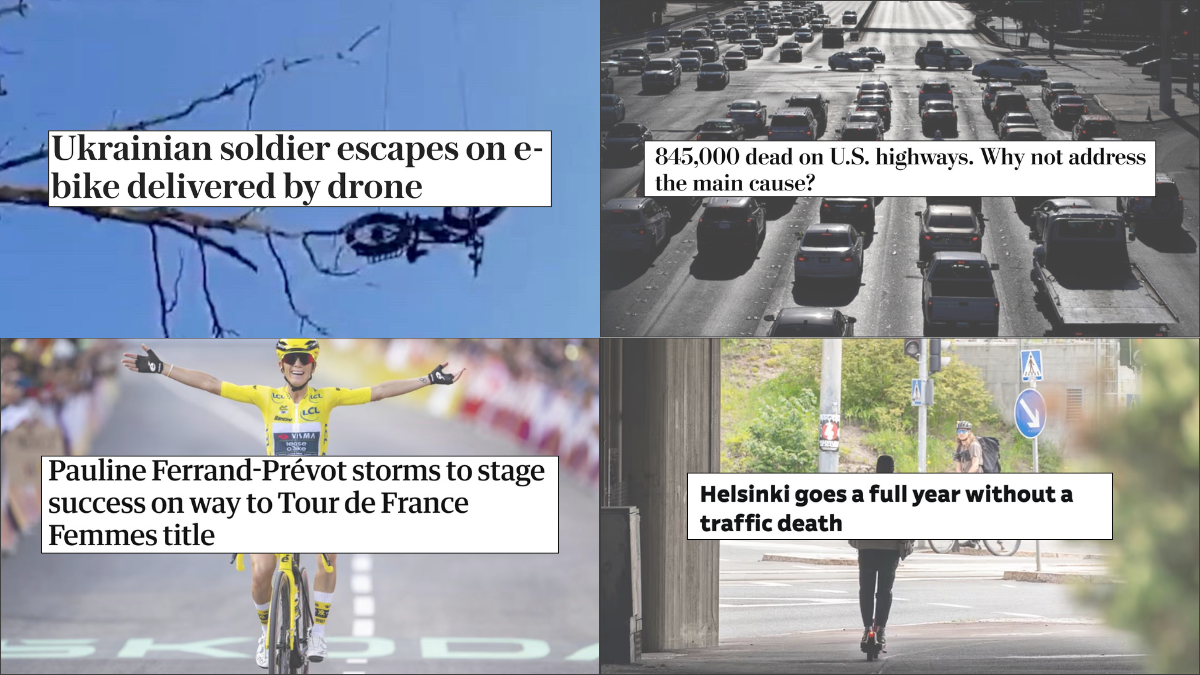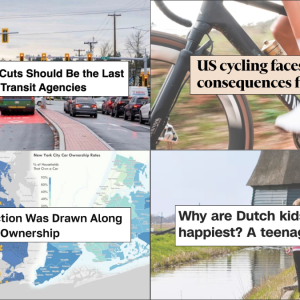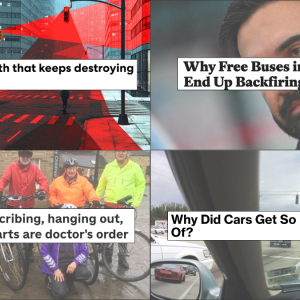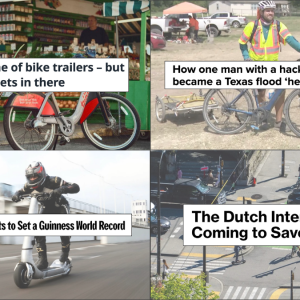Hi friends. Welcome to the week.
Here are the most notable stories that came across my desk in the past seven days…
Thrust into advocacy: Many riders get into gravel cycling to avoid drivers; but the author of this piece experienced something tragic while bicycling with a friend and says it has made him want to change the system. (Bike Gear Database)
Look in the mirror: It always feels good when an idea I’ve been beating on my desk about for a while gets carried into a national op-ed by a credible source. This 25-year automotive industry journalist believes we can save thousands of lives by simply taking more responsibility for how we drive and improving our driver education system. (The Washington Post)
E-bikes in war: A Ukrainian drone carried an e-bike and dropped it to a soldier who was stranded on a battlefield. The injured soldier rode the bike to safety. (The Telegraph)
Bathroom lobby: I’m still waiting for someone in Portland to become the champion of public restrooms. Until then, let’s educate ourselves on good public restroom policy. (Yes this is an urbanism issue!) (Greater Greater Washington)
Hell-yes-sinki: This Finnish city experienced a full year without any road traffic deaths and its transportation engineers credit reduced speed limits, better road designs, a good transit network, and more. (YLE)
E-bikes FTW: A new study from Germany found that, “43.1% of electric bicycle trips and 63.2% of electric bicycle mileage would have been undertaken using a car if no e-bike had been available.” (International Journal of Sustainable Transportation)
Tour de France Femmes: Pauline Ferrand-Prévot won the women’s Tour de France in a year that saw big crowds and more interest in the event than ever. Ferrand-Prévot has also re-ignited a passion for cycling in France. (The Guardian)
De minimis victory: Bicycle industry leaders are hailing a move by President Donald Trump that removed the $800 import threshold that allows Americans to bring in packages under that amount duty-free. It’s thought unsafe e-bike batteries and accessories and other products give overseas goods an unfair advantage and create safety hazards. (Bicycle Retailer)
Thanks to everyone who sent in links this week. The Monday Roundup is a community effort, so please feel free to send us any great stories you come across.








Thanks for reading.
BikePortland has served this community with independent community journalism since 2005. We rely on subscriptions from readers like you to survive. Your financial support is vital in keeping this valuable resource alive and well.
Please subscribe today to strengthen and expand our work.
I’ve been talking up Helsinki for a while now in conversations – that a city of similar size to ours can have 1/10th the road fatalities is a truly eye-opening stat for some people who still believe that “accidents” just happen.
over a 5 year period they averaged 6 deaths per year while we averaged 60.
Finland as a whole (with more land area than OR and a larger population) had 1/3rd the road fatalities.
Finland, along with many European countries, have a culture of “following the rules” and if you don’t, there are consequences. The USA doesn’t have that. “Rules are meant to be broken” is the refrain I heard growing up quite often.
Here and here are lists of countries by road deaths. The US is an extreme outlier (~13 per 100k) with developed nations, and ranks worse in comparison to countries such as Mexico, Russia, Georgia, Indonesia and Kyrgyzstan. There is no evidence that having a culture of “following the rules” is a significant factor related to lower road deaths.
Here is the WHO report on road fatalities from 2018, and an article on the same.
It has much less to do with “following the rules” and much more with the rules themselves, which normalize and favor unsafe behavior while driving. Related to this–the laws promoting unsafe road design–is also one of the largest factors, which is why speed is the most common contributor to crashes.
The US is an extreme outlier when it comes to just about anything that leads to preventable loss of life in high-income nations. IMO, the root cause of this preventable slaughter is not a lack of infrastructure or laws/policy but a society-wide lack of basic human empathy.
Gunshot death:
https://en.wikipedia.org/wiki/Gun_violence#/media/File:Gun-related_death_rates_in_high-income_countries,_2010.svg
Gun-related suicide:
https://en.wikipedia.org/wiki/Gun_violence#/media/File:Gun-related_death_rates_in_high-income_countries,_2010.svg
Drug overdose:
https://www.commonwealthfund.org/blog/2025/us-overdose-deaths-remain-higher-other-countries-trend-tracking-and-harm-reduction
Road deaths:

https://www.oecd.org/content/dam/oecd/en/publications/reports/2023/12/road-safety-annual-report-2023_f83ca809/8654c572-en.pdf
Why do you live here if everywhere else is better?
It’s easier to burn a flag and complain.
It’s far, far easier to be an ignoramus who believes in ‘murrican exceptionalism.
MOTRG wasn’t burning a flag.
A lot of other countries were far worse statistically than they currently are. It took concerted effort from a broad spectrum of the electorate to reform gun laws in places like Canada or Australia, that used to be more lax, or improve streetscapes and vehicle safety laws in European countries. It’s totally fair to point out that other countries do things better and to ask Americans to strive to improve.
The United States is the way it is because people made specific policy decisions. It’s not just cultural differences. There’s nothing intrinsic about Americans that forces us to have outrageous rates of homicide and vehicle deaths. We can choose to be better.
Why do you believe that empathy for your neighbors is not important?
Because my job doesn’t lend itself to a digital nomad visa. Because we don’t yet have the ability to retire with the passive income necessary to get a visa to live where we want.
But it’s coming, we’ve made a lot of sacrifices over the years to enable us to live somewhere without the cultural indifferent to other people’s lives that exists in the US and manifests itself in both the incredibly selfish behavior behind the wheel *and’* the incredible opposition to the changes necessary to dramatically reduce the unnecessary loss of life we see constantly in this country.
I live in Portland because this is my hometown, and I’ve been all around the country and can’t really find anywhere else that is exceptionally better. It’s hard to migrate to a foreign country for the average person. I wish it were easier. I’d love to get EU citizenship and find a nice, safe, urban area with robust transit, walkable and bikeable streets and so forth. I could try living in Amsterdam, Copenhagen, Paris, Freiburg, Oslo, or Helsinki or any number of other places. Alas, that is not the world we live in.
Are demographics eye opening? Do we think we have too many deaths because of speed limits, lol?
What exactly do you mean by “demographics”? Promoting white nationalist conspiracy theories now, are we?
I spent several weeks in Helsinki years ago, and it was eye-opening for me as a Seattle high-school kid. The public transportation system mentioned in the article was incredible even back then. There was really no need to own a car (which was very expensive) for most people.
The other notable thing was the urban design. Neighborhoods were designed as nodes, with each node containing a mix of housing types (including high-density apartments) plus shopping, schools, parks, offices, etc. connected to the City’s core with the excellent public transportation.
Helsinki’s offering people self-contained neighborhoods that dramatically reduce the need for many people to drive or even take public transportation must certainly also help it achieve zero traffic deaths.
It’s also notable that those zero deaths were achieved in a place with heavy alcohol use (at least back then) and winter days with only a couple hours of daylight and hazardous weather conditions.
Finland also ties traffic ticket fees to income. Fines can be thousands of dollars for wealthy drivers as I recall.
I’ll be interested to see if the change in de minimis import duty exemption is actually enforced, and if so, how. Are they going to inspect packages? Are they going to shut down retailers that don’t charge duties at the point of sale? Are they going to prosecute Americans that don’t voluntarily pay the fees? How is this all going to work? Seems like Amazon, ebay, temu, shein et al are the biggest issues. Is the federal government really going to risk angering those companies and their armies of lobbiests and lawyers? Is Trump just trying to shake down a few big players in hopes of pocketing some more cash?
I’ve been advocating for public facilities in Portland – I just emailed my Council members about it last week. The public facilities in San Francisco are so popular that they expanded to 24/7 access.
I’ve experienced good public restroom facilities in some places, but they take a ton of maintenance, upkeep, and oversight. I thought the Portland loo was a great idea when they first were installed, but in recent years, I’ve seen people just turn them into temporary campsites or completely trash them. Haven’t even thought about them as a viable option for use for quite some time.
Japan has some great public toilets. They’re well maintained and people don’t trash them. I don’t know if they would work as well here.
More like de minimis loss for DIY ebiking. The proprietary ebike cartel gets their way.
Exactly. The de minimis exception made my Nomad conversion affordable for my miserly social security income when my old knees made the motor a necessity. Guess I’ll just hope I don’t need to eat too may beans when the battery needs to be replaced. And Clever Cycles piles on by cutting me off from working on the Breezer they sold me even though they will work on other Bafang units.
The link in the Washington Post paragraph leads to the Bike Gear article by Barry Lachapelle.
I think this is correct URL:
https://archive.ph/oXgDc
I enjoyed the Tour de France Femmes avec Zwift much more than I thought I would. PFP is an amazing cyclist.
Helsinki probably doesn’t tolerate the lawlessness we do here in Portland.
I’m all for improving driver education, but that itself is a systemic change, not an individual one. Traffic deaths in Canada have dropped by 18% while those in the US continue to climb. Did Canadians suddenly discover “individual responsibility”?